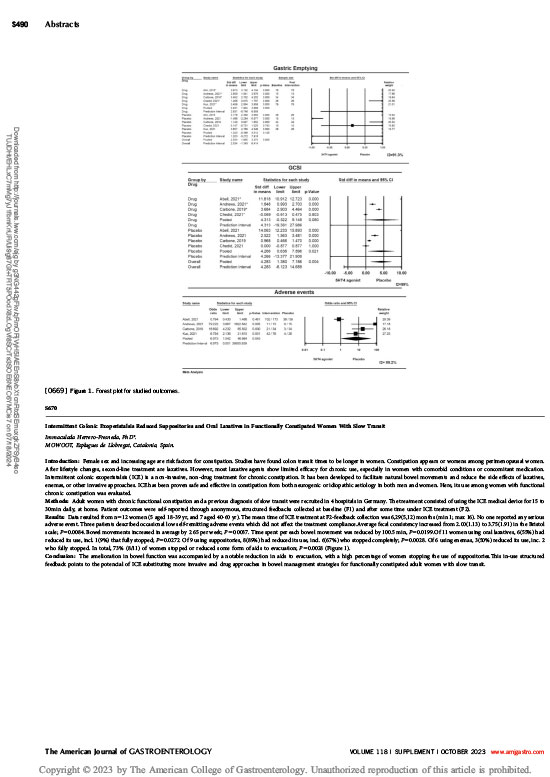Intermittent Colonic Exoperistalsis Reduced Suppositories and Oral Laxatives in Functionally Constipated Women With Slow Transit
October 2023
Introduction: Female sex and increasing age are risk factors for constipation. Studies have found colon transit times to be longer in women. Constipation appears or worsens among perimenopausal women. After lifestyle changes, second-line treatment are laxatives. However, most laxative agents show limited efficacy for chronic use, especially in women with comorbid conditions or concomitant medication. Intermittent colonic exoperistalsis (ICE) is a non-invasive, non-drug treatment for chronic constipation. It has been developed to facilitate natural bowel movements and reduce the side effects of laxatives, enemas, or other invasive approaches. ICE has been proven safe and effective in constipation from both neurogenic or idiopathic aetiology in both men and women. Here, its use among women with functional chronic constipation was evaluated.
Methods: Adult women with chronic functional constipation and a previous diagnosis of slow transit were recruited in 4 hospitals in Germany. The treatment consisted of using the ICE medical device for 15 to 30min daily, at home. Patient outcomes were self-reported through anonymous, structured feedbacks collected at baseline (F1) and after some time under ICE treatment (F2).
Results: Data resulted from n512 women (5 aged 18-39 yr, and 7 aged 40-60 yr). The mean time of ICE treatment at F2-feedback collection was 6,29(5,12) months (min 1; max 16). No one reported any serious adverse event. Three patients described occasional low self-remitting adverse events which did not affect the treatment compliance.Average fecal consistency increased from 2.00(1.13) to 3.75(1.91) in the Bristol scale; P50.0084. Bowel movements increased in average by 2.65 per week; P50.0037. Time spent per each bowel movement was reduced by 100.5 min, P50.0199.Of 11 women using oral laxatives, 6(55%) had reduced its use, incl. 1(9%) that fully stopped; P50.0272. Of 9 using suppositories, 8(89%) had reduced its use, incl. 6(67%) who stopped completely; P50.0028. Of 6 using enemas, 3(50%) reduced its use, inc. 2 who fully stopped. In total, 73% (8/11) of women stopped or reduced some form of aids to evacuation; P50.0028 (Figure 1).
Conclusion: The amelioration in bowel function was accompanied by a notable reduction in aids to evacuation, with a high percentage of women stopping the use of suppositories.This in-use structured feedback points to the potencial of ICE substituting more invasive and drug approaches in bowel management strategies for functionally constipated adult women with slow transit.

